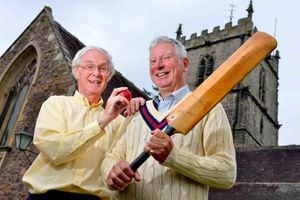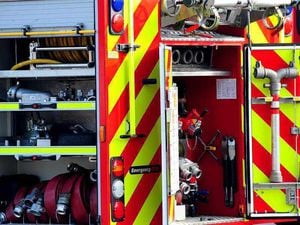Revealed: When Beefy blamed chaplain for the rain
It was March 1992, and Andrew Wingfield Digby was waiting in the changing rooms after rain had interrupted what had looked like a certain England victory in the cricket World Cup.

Andrew was chaplain to the England team that had just bowled Pakistan out for 74, and at 21 for 1, Graham Gooch's men looked nailed-on for victory.
But Ian Botham was not happy about the precipitation.
"Ian Botham comes up to me and says 'You're useless, you are', and I said 'What have I done?," recalls Andrew.
He said 'It's raining, and it's your fault. The only people laughing are the Pakistani captain and his team. It's not surprising there's a worldwide movement in favour of the Islamic faith."
Andrew, who was guest speaker at a lunch in St Laurence's Church in Church Stretton, had known Beefy since his university days, but even he was a bit surprised to be blamed for the weather.
"If you work with England cricket team, it's all about winning," he says.
"They thought that the point of having a chaplain – or spiritual adviser as they called me – was that it would help them win."
Andrew first encountered Botham while playing for Oxford University in the early 1970s.
"In those days, the first-class counties would play against Oxford University, and if we had a three-day game and we could stretch it into the third game, we thought that was something of a triumph.
"We didn't know much about winning, but if we got a draw it felt like we had won. Ian Botham was playing for Somerset, and I would sometimes go up against him."
Andrew was appointed chaplain in 1991 by then England cricket supremo Ted Dexter. It was hardly a vintage time for English cricket – the disastrous 1988 Test series against the West Indies, when England got through four different captains, was still fresh in the mind, and the Scottish cricketers had just declared their independence from England and Wales. The side had stabilised slightly since the dark days of the 1980s, but it was still in a state of flux about which direction it was travelling in. After another humiliation in the 1990-91 Ashes series, Dexter noticed that Australia had a chaplain, and thought it was worth a try.
While it was not a time when England excelled on the field, it was a time that was dominated by big personalities. The age of television made the likes of Botham, Gooch, Mike Gatting and David Gower into household names, but Andrew saw these people in a very different light from the way they appeared in the media. He says he does not recall any real egos in the dressing room.
"They were all great lads," he says. "Some people seem to be in awe of celebrities, but when you when you meet people they are just the same as everybody else.
"They were a great bunch of lads. Mike Gatting was a larger-than-life personality, and Ian Botham had a way of putting things, his precise words which I could not always use when addressing Christian audiences.
"There was a lot of laddish banter, but I always used to know when it was just the right time to extricate myself from that."
He remembers going to see captain Gooch just after being appointed chaplain, and Botham being on the massage table.
"He said 'don't worry Wingers, me and Lamby will sing in the choir'," says Andrew. "And that broke the ice. I think the fact that I had played a bit made them a little bit less suspicious than they would have been if I was just a regular vicar."
While he was always aware that his prowess on the cricket field could not match that of the professionals, he did occasionally get his own back when they tried other sports.
"We used to spend a lot of time together, playing golf and fishing. I wasn't going to beat them at golf, but I was a bit better at fishing than most of them."
Andrew, who was also a chaplain at the 1988 Seoul Olympics, says he feels a great deal of sympathy for England vice-captain Ben Stokes, who was arrested earlier this week following an alleged incident at a Bristol nightclub: "He is just an ordinary bloke going out on the lash, but when you're in the public eye it is very easy to be targeted."
Indeed, while playing for Dorset, Andrew remembers his team sometimes attracting the interest of the tabloids.
"We appeared on page three of The Sun three times," he says, "which is not something you expect for Dorset Cricket Club."
One of these occasions followed a game against Shropshire, played at Wellington, which ended in a minor brawl.
"Our fast bowler played a beamer at Shropshire's no. 11 batsman, it was at head height and was pretty dangerous, and the batsman was not very good.
"He managed to avoid getting hit, but the non-striking batsman approached our bowler at the end of the game, and began to shout at him saying he shouldn't have bowled a beamer at him.
"The next thing we knew, our fast bowler had laid one on the non-strike batsman."
Another time the club hit the headlines was when three wickets were taken in four balls, followed by a five-minute delay for one of the batsmen to take to the crease. The player, caught unaware by the collapse in the batting, had been in the toilet, and was immediately given out before he had played a single ball."
Of course, as the personal confidante of some of the nation's top sportsmen, one might expect Andrew to know plenty of stories which would keep the tabloids going for months. But if that is the case, he is not giving anything away.
"The serious point is that there is a very strict rule of confidentiality," he says. "Apart from being a Christian, part of my role was also that people knew they could talk to me about anything in the strictest confidence."
Andrew remained as the England team's chaplain until 2000, and he says there were plenty of laughs along the way.
One moment in particular brings a smile to him.
"Being introduced to the British ambassador by Phil Tufnell as his 'personal spiritual adviser'," he recalls.
"I'm not sure I did a terribly good job there."





